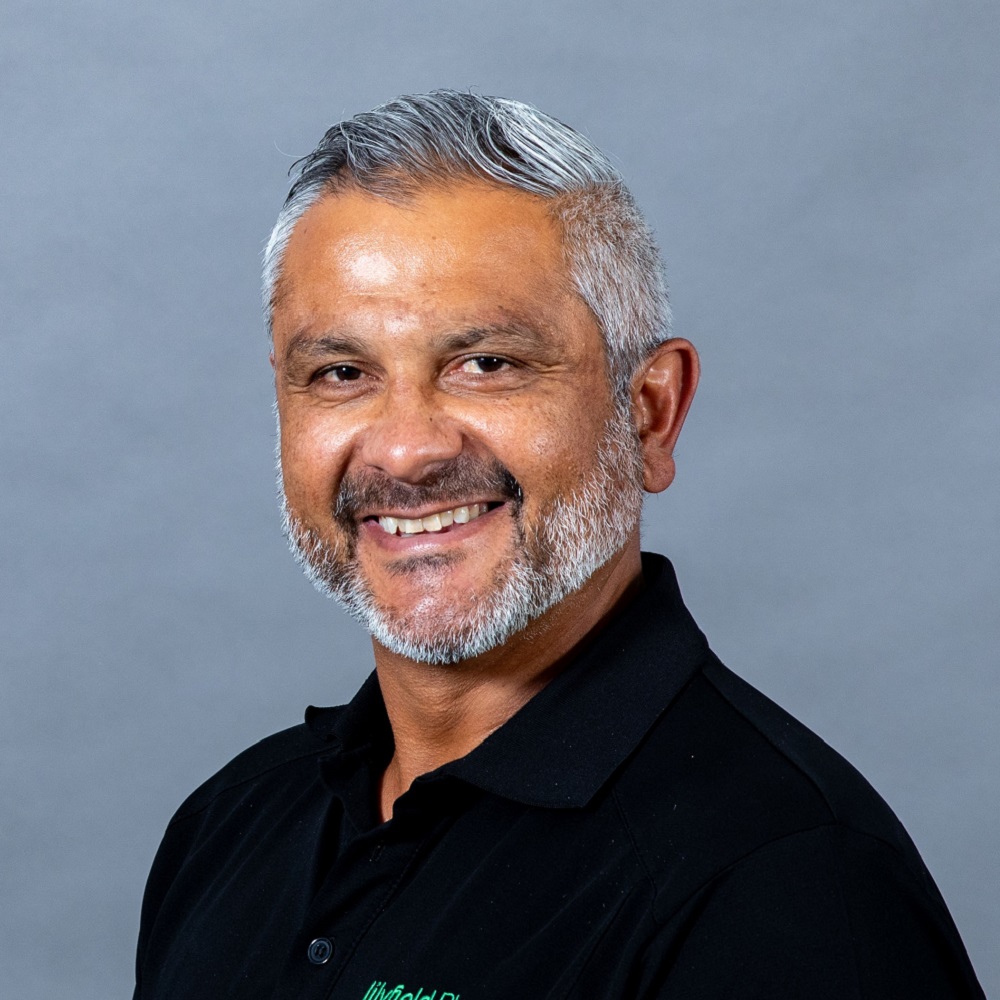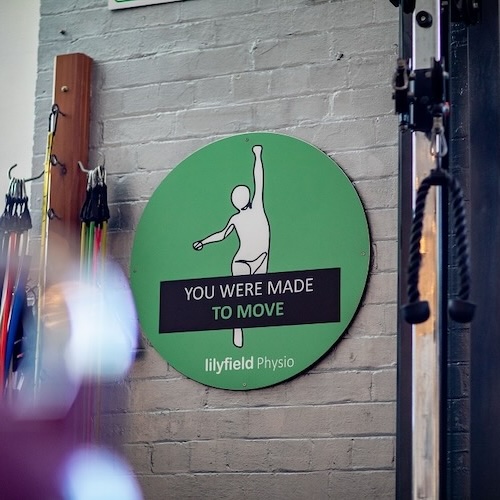Book a Physio for Tendinopathy
Our tendinopathy physio services in Sydney are delivered by a highly experienced team led by Kam Bhabra (former physiotherapist to Arsenal FC and PGA Tour athletes, with deep expertise in sports tendon injuries), and Karen Westcott (Principal Physiotherapist with specialist skills in biomechanics, spinal care, and Clinical Pilates).
They are supported by Niamh Davies, who brings a strong background in sports rehabilitation and post-operative recovery, and Angel Nang, an Accredited Exercise Physiologist with particular interests in chronic disease management, cancer rehabilitation, and strength-based conditioning for older adults.
You’ll find us at:
- Mon – Tue: 7:00 AM – 7:00 PM
- Wed: 7:00 AM – 7:30 PM
- Thu: 7:00 AM – 6:00 PM
- Fri: 7:00 AM – 4:00 PM
- Sat: 8:00 AM – 1:00 PM
- Sun: Closed

How Does a Physio Help With Tendinopathy?
Through a combination of pain management techniques, targeted strengthening, and movement retraining, we help you achieve lasting recovery. Our goal is not only to relieve your current symptoms but also to equip you with the knowledge and tools to prevent recurrence.
- Symptoms: Heel or calf pain when walking, running, or climbing stairs; morning stiffness.
- Causes: Overuse, sudden activity increases, poor footwear, calf tightness.
- Treatment: Eccentric calf strengthening, manual therapy, shockwave therapy, load management.
- Recovery Timeline: 6–12 weeks for significant improvement, with ongoing conditioning advised.
- Symptoms: Pain at the base of the kneecap, worse with squatting, jumping, or stairs.
- Causes: Repetitive jumping or landing, quadriceps overload, high-impact sports.
- Treatment: Isometric loading for pain control, progressive quadriceps strengthening, sport retraining.
- Recovery Timeline: 8–12 weeks, with a focus on gradual return to sport.
- Symptoms: Pain on the outside of the elbow, weakness with gripping, pain lifting objects.
- Causes: Racquet sports, repetitive gripping, manual labour.
- Treatment: Targeted forearm strengthening, shockwave therapy, ergonomic advice, manual therapy.
- Recovery Timeline: 6–10 weeks depending on severity and activity modification.
- Symptoms: Pain on the inside of the elbow, reduced grip strength.
- Causes: Repetitive wrist flexion, heavy lifting, sporting overload.
- Treatment: Strengthening of wrist flexors, soft-tissue release, gradual loading programs.
- Recovery Timeline: 6–8 weeks with progressive rehabilitation.
- Symptoms: Shoulder pain when lifting the arm, night pain, loss of strength.
- Causes: Overhead activity, postural overload, tendon wear and tear.
- Treatment: Rotator cuff strengthening, scapular stabilisation, joint mobilisation, dry needling.
- Recovery Timeline: 8–12 weeks, with functional improvements often seen in the first month.
- Symptoms: Pain on the outside of the hip, worse when lying on your side or climbing stairs.
- Causes: Overload of gluteal tendons, weak hip stabilisers, poor pelvic control.
- Treatment: Hip abductor strengthening, load management, shockwave therapy, education on positions to avoid.
- Recovery Timeline: 8–12 weeks with structured rehabilitation.
Initial Consultation: $160
Review Assessment and Consultation: $155
Standard Consultation: $125
Please note: A cancellation fee of $83 applies for cancellations within 24 hours of the scheduled appointment. Private health rebate applicable.
Ongoing Rehab & Exercise Classes for Tendinopathy
In addition to one-on-one physiotherapy, Lilyfield Physio offers group rehab and exercise classes designed to support your long-term health. These classes focus on building strength, improving mobility, correcting movement patterns, and maintaining joint resilience.
With a wide range of class types and convenient times, there’s plenty of opportunity to continue progressing safely under expert guidance.
Ready to Recover From Tendinopathy?
If tendon pain is stopping you from living fully, our physiotherapists at Lilyfield Physio are here to help. With personalised programs designed around your lifestyle and goals, we’ll guide you from pain relief through to rebuilding strength and resilience.
Book your tendinopathy physio appointment in Sydney today and take the first step toward lasting recovery.

Our Approach to Tendinopathy Physio
- Comprehensive Assessment: Detailed history, physical testing, and imaging referral if needed.
- Manual Therapy: Soft-tissue release, joint mobilisation, dry needling.
- Progressive Loading: Isometric, eccentric, and heavy slow resistance exercises.
- Exercise Prescription: Strength, flexibility, and return-to-sport programs.
- Education: Load management, ergonomics, footwear advice, lifestyle adjustments.
- Progress Review: Ongoing monitoring and program adjustment to ensure sustained recovery.
What Causes Tendinopathy?
- Sudden increase in training load, intensity, or frequency without proper progression.
- Repetitive strain from sport, work, or lifestyle habits that place ongoing stress on tendons.
- Muscle weakness, imbalance, or reduced flexibility in surrounding structures.
- Poor movement control, biomechanics, or posture contributing to faulty load distribution.
- Age-related changes in tendon structure, such as reduced collagen quality and blood supply.
- Inadequate recovery, rest, or sleep leading to poor tissue repair.
- Systemic factors including metabolic conditions (e.g. diabetes, high cholesterol), hormonal influences, and overall health status that can affect tendon resilience.

Meet Our Tendinopathy Physios
Lilyfield Physiotherapy is proud to offer some of Australia’s most experienced and highly qualified scoliosis physiotherapists, committed to helping you move better, faster.
FAQs
Tendinopathy is a condition involving pain and impaired function in a tendon, often caused by overload, repetitive strain, or age-related changes. It can affect any tendon in the body, with common sites including the Achilles, knee, shoulder, elbow, and hip. Unlike the older term 'tendonitis,' which suggests inflammation, tendinopathy reflects a broader process of tendon irritation and degeneration.
It’s a specialised form of physiotherapy using exercise-based rehab, manual therapy, and education to restore tendon health and function.
They’re often used interchangeably, but tendinopathy is the broader, more accurate term covering both irritation and degeneration.
Most cases improve within 6–12 weeks with consistent physiotherapy, though chronic cases may take longer.
Yes. Tendonitis physio is part of our approach — we treat acute and chronic tendon conditions alike.
Yes. Progressive loading under guidance remains the most effective treatment, even for long-standing tendon issues.
If you have private health cover and subscribe to the “extras” cover, you may be eligible to claim part of your treatment fee. There are many different schemes and you are best advised to check your level of cover with your insurer. Most health funds are online with HICAPS, which allows you to claim your health fund rebate immediately at our clinic, leaving only the gap for you to pay. You will need to bring your health fund card with you.
Yes, in some cases. Medicare now offers chronic disease management referred to as Enhanced Primary Care (EPC) plans, for people with chronic conditions. This allows for a Medicare rebate, for up to 5 physio or exercise physiology treatments a year. You must be referred by your GP and you need to bring your Medicare card with you. If you have any queries regarding this service, please don’t hesitate to speak with our staff or discuss your eligibility with your GP.
Following a comprehensive assessment, including functional testing and physical examination, we shall establish a preliminary diagnosis and discuss your treatment options and expected outcomes with you.
Treatment may involve different options for relieving pain, restoring function, flexibility and strength.
You will learn techniques to use at home to manage your problem, which may include preventative measures and exercise.
During your consultation, please feel free to ask ass any questions as you wish. A good understanding of your condition is important for your recovery. This includes your likely recovery time, number of sessions required and future exercise advice.
We may liaise with others involved in your care., If applicable, we shall also refer you onto other health professionals to play a role in your recovery.
You are welcome to wear whatever you are most comfortable in. For Exercise sessions and classes, please wear exercise clothes and a pair of socks, making sure you able to move freely
Please bring along any doctor’s referral letters, scan or x-ray results and your private health insurance card so you can claim for your treatment on the spot.
Your Physiotherapist will complete a thorough assessment of your complaint and then provide you with a preliminary diagnosis and appropriate treatments based on their findings. This will generally consist of some hands-on treatment, advice and often you will receive some exercises to do at home. Your Physiotherapist will also discuss with you their plan for management which will include likely recovery time, number of sessions required and future exercise advice.
We accept cash, EFTPOS, VISA and MasterCard. If you bring your private health insurance card with you, we can process an on-the-spot claim via our HICAPS terminal and you will then only need to pay the gap fee.
Yes. Physiotherapists can refer patients directly for MRI scans, provided they have completed the appropriate training and accreditation. Your physiotherapist will determine if an MRI is necessary based on your assessment and condition.
Yes. Physiotherapists can provide medical certificates (sick notes) for issues related to musculoskeletal or physical health concerns. These certificates can cover time off work, recommendations for modified duties, or clearance for returning to regular activities.
We accept referrals for Compulsory Third-Party Insurance claims. Once you have seen your GP and received a claim number, we are able to send any invoices directly to the insurer. If you need to start treatment before you have a claim number, we shall ask you to cover the cost of the treatment and claim from the insurer later.
You can cancel and re-schedule by calling our rooms on 9810 2203. For after hours, we have an answering machine service for you to leave a message. Our receptionist will contact you shortly after it is received to confirm cancellation or to help you re-schedule.
We request that if you are unable to make a consultation or class that you let us know at least 24 hours prior to your appointment so that someone else can use your treatment time.
We have a cancellation fee policy for late cancellations or missed appointments.
This practice takes great care to ensure that our information records are accurate and are treated with full regard to the privacy of our patients. We only collect information from our patients that is necessary for good health care and aim to ensure that any information we hold is accurate, complete and up-to-date.
The health information we hold helps us provide our patients with the best possible health care, and is disclosed only to others involved in your treatment, such as your doctor. If we need to disclose information about you to people other than those associated with your treatment, we will seek your permission first.
Occasionally we may be involved in research on health issues. If any data from this practice is used in research, it will not include information which identifies our patients.
This practice is bound by the Privacy Amendment (Private Sector) Act 2000, and operates in accordance with the Code of Conduct of the Australian Physiotherapy Association. If you would like to discuss any aspects of our privacy policy, or review your health records, please advise your treating Physiotherapist or Exercise Physiologist.













